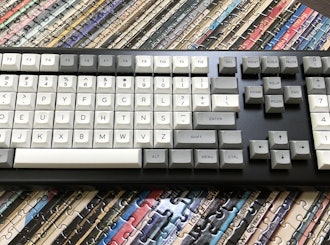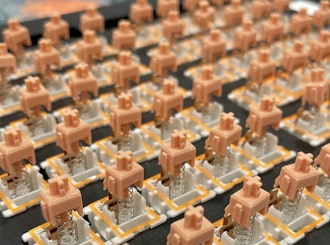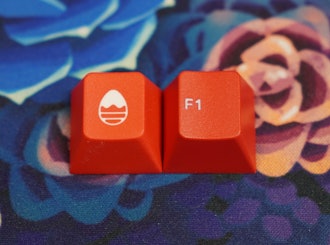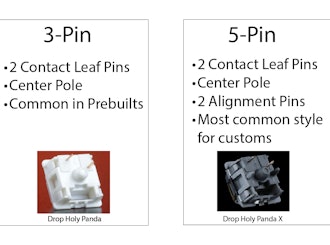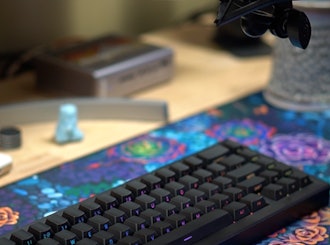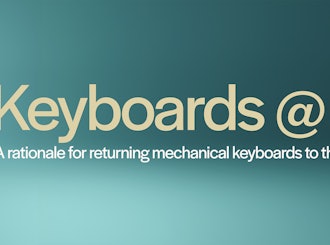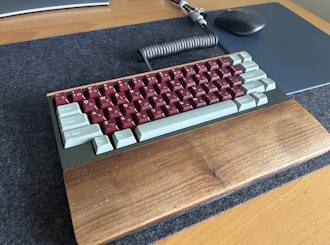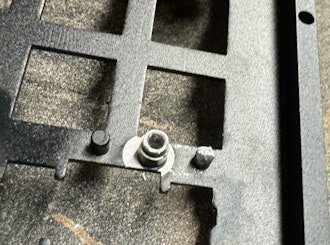Click to view our Accessibility Statement or contact us with accessibility-related questions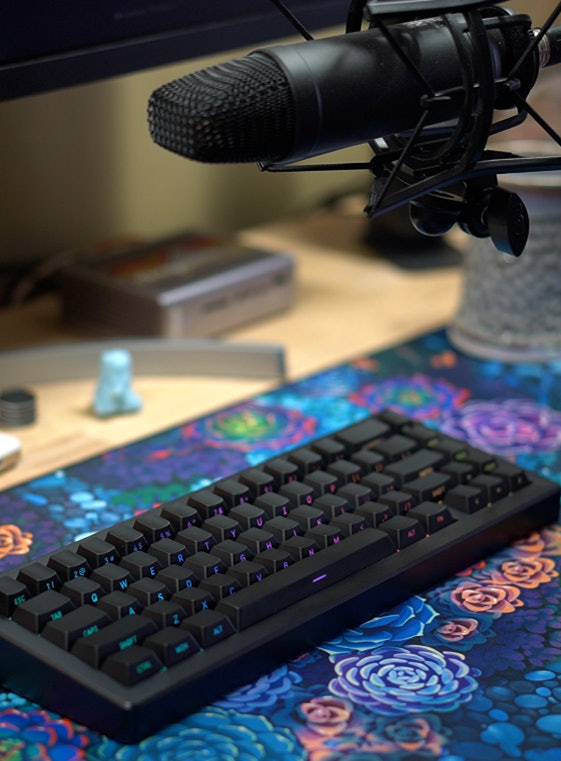
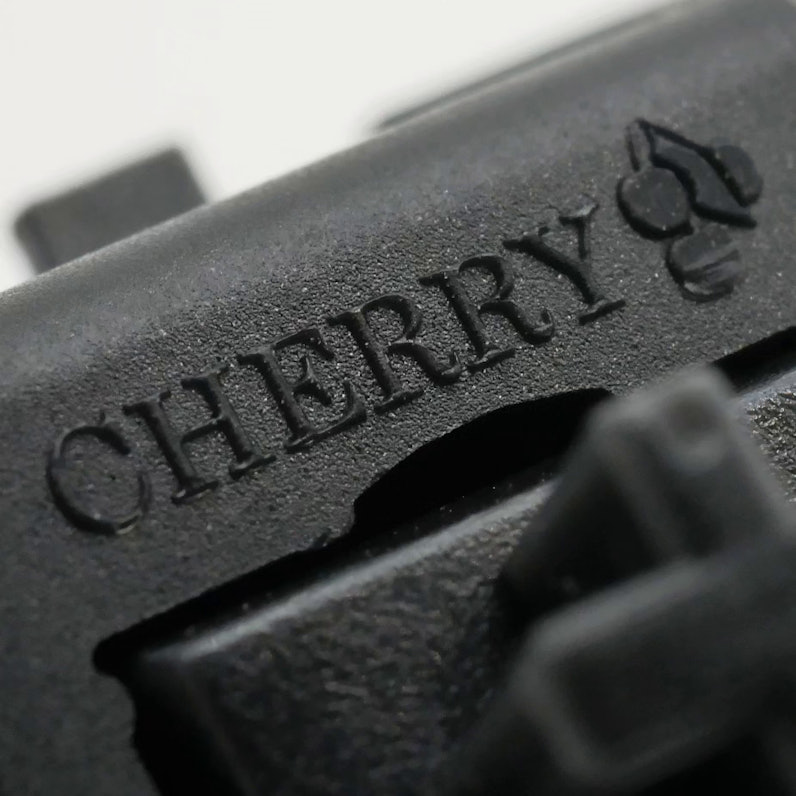
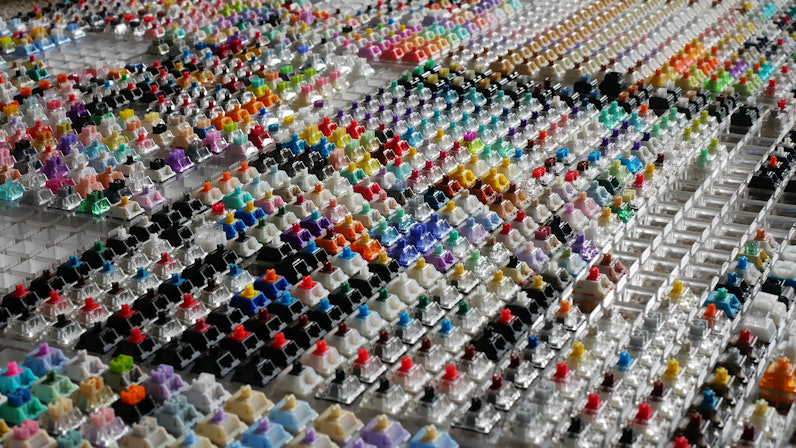
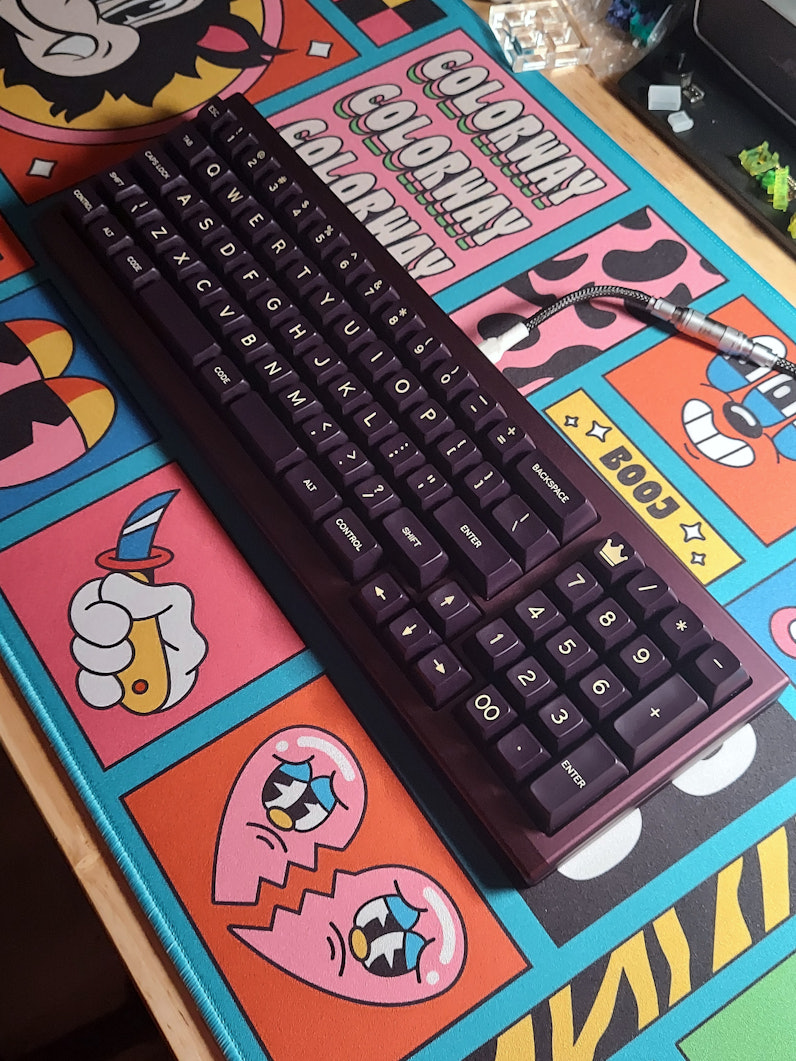


















Mechanical Keyboard Sound Isn't That Simple

Figure 1: I couldn't think of a more literal way to represent this article if I tried...
Looking back just a few years ago, there’s no doubt that the huge influx of people that joined the hobby at the peak of the COVID pandemic were drawn to keyboards by way of YouTube, TikTok, and other audio-visual content platforms. Even as the output from these content creators has waned in recent months, their collective impact and legacy on the keyboard hobby is rather firmly etched in the history books. As a result of all of their sound tests, build logs, and opinion videos, the message is clear to any new person joining the hobby: mechanical keyboards are all about the sound. Thock this, clack that. Whether it’s keyboards, keycaps, or even singular switches, seemingly everyone new to the hobby meticulously pores over each component of their keyboard not in an attempt to figure out how it will feel in hand, but how it will sound as they’re furiously grinding their way out from Bronze III in League of Legends. However, as a result of trying to keep up with the clicks and clacks that they find in their increasingly typing-test centered keyboard aesthetic, these people newest to the hobby almost always end up quite short of their expectations after building their first boards. Sound tests for mechanical keyboards aren’t all that they’re cracked up to be and it's a hard lesson to learn. So to hopefully save you some heartache, let’s go ahead and look at why the sound of mechanical keyboards is a lot more nuanced and difficult to figure out than you would have guessed.

Figure 2: Yes even switches play a bigger role than you'd think. (Ha, get it?)
While keycaps and keyboards definitely play a role in how your keyboards end up sounding, as we will discuss in a bit below, let’s go ahead and start at what people assume to be some of the “simplest” parts of any keyboard - the switches. Let’s make it even easier by making this discussion only about linears. (Sorry to those of you who were sucked into the hobby by the multi-million view Holy Panda typing test from Taeha…) By the time you’re reading this, you’ve probably already heard something to the effect of “Cherry MX Blacks are deep, thocky, and have a bass-y sound.” Or, you’ve probably heard of entire swathes of switches being called “creamy” or “clacky” broadly without any more specifics added on. As I dive a bit deeper into in my article here on Drop titled ‘We Know Nothing About Switch Materials’, these onomatopoeias are only really loose correlations that don’t really work well across all the different switches that exist out there. For example, people will often claim that Cherry MX Blacks sound this way because of their nylon housings, but if you’ve ever tried switches with nylon housings from Tecsee, Durock/JWK, TTC, or nearly any other brand out there - they all sound a bit different from one another. And that is before you add in how different tactile bumps affect the sound of switches as well! While these sorts of loose ideas used to work back in the day when there were only a handful of switches, there’s over 2000 different MX-style switches out there right this second from nearly two dozen different manufacturers that all have their own unique twist and tweaks on the designs of their switches. Just because you’ve found some switches that share the same housing material or brand as those seen in a video of your dream keyboard doesn’t promise that they will sound the same and don’t let people who’ve only tried a handful of switches themselves convince you otherwise. In addition to this, any sort of modifications you make to your switches - such as lubing them or filming them - will 100% change how your switches sound. However, there are other challenges to keyboard sound that are (quite literally) bigger than this.

Figure 3: Trust me, there's at least some variety in sound out there...
Once you’ve picked out your favorite switches with a bit more careful consideration than you would have before reading that last paragraph, they actually have to go into a keyboard. Unless you want to be one of the strange ones who just collects switches like myself, you’re going to end up putting these switches into a PCB and slapping some keycaps onto them for daily use. As you probably already guessed, the material of your keyboard can and does affect its sound. No worries, Goat, I was only going to stick with aluminum and not go for any keyboards that have brass in them. Did you stop to consider that keyboards with different internal structures can affect the sound of your keyboard? Hollow, airy cases like that of the classic CA66 can and do sound extremely different than the dense, dozen-piece construction of modern Matrix branded keyboards - and that's even if you end up using the exact same switches. Whether or not you put foam in between the PCB and switch plate, foam between the PCB and case, or even so much as simply put tape on the back of your PCB, all of these things alter how the sound vibrations of your switches bounce around and make their way to your ears. Keycaps are no exception to this either! In addition to ABS and PBT keycaps causing keyboards to have slightly different sounds just because of differences in their densities, keycap profiles can also affect sound in a similar way to the CA66/Matrix board comparison above. Taller profiles like SA or MT3 can and do cause switches to sound ever so slightly differently than flatter profiles like DSA. Don’t worry though, the complexities of sound keyboards don’t stop there either!
Go ahead and mentally sum up all of the factors mentioned above that affect the sound of keyboards - switches, aftermarket modifications to switches, keyboard case material, keyboard case size and structure, keycap material, keycap profile - and go watch your favorite keyboard sound test again. In addition to probably realizing that the content creator who posted that probably didn’t include all of those details in their setup, did you see if they were using a desk mat or not? Was their desk made out of wood or of plastic? Did you see the floor in their room and did it have carpet or a rug? Believe it or not, all of the things in the immediate surroundings of a keyboard that dampen or reflect sound actually affect how they sound as well. I personally learned this the hard way when I moved out of a studio apartment with high ceilings and hardwood floors into a normal-height, carpeted place with a separate office causing all of my keyboards to sound drastically different from one another. While you’re realizing all of those things in that typing test video that are different from your own setup, you might also want to consider that various sound capturing devices, audio compression algorithms on these platforms, and even the audio playback quality on your device you’re listening to it on can and do have a very real effect on how that keyboard sounds in that video. And all of that is even before you start guessing as to whether or not that content creator edited their video to get all of those tens of thousands of view’s worth of ad revenue…

Figure 4: The exact keyboard that I used to figure out how much room acoustics change the sound of a board!
All in all, it’s almost impossible to perfectly replicate the sound of a keyboard video you see on TikTok or YouTube in a build of your own. While a good amount of this article may seem obvious to some people who have built a keyboard or two of their own thus far, this is the first time many people fresh into the hobby have stopped to consider all of these various factors at once. Unfortunately, the easy, clean, and seamless advice you find online isn’t quite as good as most people would lead you to believe. The only true way to determine how a keyboard will sound in your own personal setup is through trial, testing, error, and probably a few more iterations through that loop again. In the meantime, reading some other articles about switches may help, since I know a thing or two about that. Consider ‘The Vintage Switch Conundrum’, or maybe ‘Switch Myths That Aren’t Actually True!’
(Edited)

search
close
Sort by: Newest
keyboard_arrow_down
Sceptic
9
Apr 24, 2024
And for those of us wanting as little sound as possible from their keyboard, any tips? I've been considering getting a mechanical keyboard, but I have absolutely no interest in having to hear one more than I have to.

Miguel315
5
Apr 26, 2024
Scepticgamakay phoenix switches. I used them in my sense75 keyboard and they are super silent.

Blaise42
0
Apr 24, 2024
Hi, what is the brand/type of the keyboard (first image) where the symbols are on the side of the keyboard, and the top is solid black? (this is a beautiful keyboard)

Keyboy
4
Apr 14, 2024
I ordered hmx sillyworks they sounded way different than I thought after I watched a sound test
Zitovino
2
Mar 28, 2024
I pored over so many options. Then I chose my first switches and waited a looong time for them to come. When they finally did, I did some casual sounds comparisons outside of the keyboard. Then I took a looong time to live them. This was fun. I even got creative and carefully added some polymer clay to the recesses of the larger keys. Just to get rid of any hollow sound. So that was the buildup for finally getting them all together, putting my new key caps on them and finally doing my first sound test. Well I'm not going to say I'm disappointed. But the sound was just different than I was expecting. I wanted what I thought of as a basey thock and what I ended up with was a creamy sort of luxury sound. It felt good but it was not what I expected. So I am glad for this article because that was my project and I love it. But it doesn't sound like any keyboard where the microphone is way up close in the sound test and then you're also listening to it through headphones that have good bass response at a high volume. There's just so many variables, even outside of materials. What is important to me is that the end result is something that I enjoy very much and maybe I'll do it again. But not to make it right. It is right. Because it is mine.
Related Posts

dvorcol
Support for Alternative Layouts
This is a summary of how alternative layouts have been supported by kits such as Colevrak and Homing. It is not a discussion of alt layout performance and development, but if that interests you I highly recommend starting with Pascal Getreuer’s A guide to alt keyboard layouts (why, how, which one?). It’s a concise and comprehensive overview with links to some great sites that go deeper. He also has a separate Links about keyboards page. The Keyboard layouts doc he recommends explains layout goals and metrics in detail, summarizing the alt layouts discussed here as well as more than one hundred others. Sculpted-profile The majority of custom keycap sets are sculpted-profile (Cherry, SA, MT3, KAT, etc. - more on profiles generally here) so let’s start there. Because each row has a unique keycap shape, alt layouts require a unique keycap for each legend that moves off its QWERTY row. At first there were two The Dvorak layout was patented in 1936 by August Dvorak & William L....
Apr 23, 2024
ThereminGoatMK
Do I Need to Lube My Keyboard Switches?
Figure 1: Sometime around here is a good time to ask that question... If you’re new to the mechanical keyboard hobby, I have no doubt that planning your first keyboard build is a bit of a daunting task. To be entirely honest with you, it’s only a tiny bit less daunting for your second or even third keyboard builds should you stay around a little while longer. You’ve got the keyboard itself to worry about, stabilizers, keycaps, and even switches on top of all of the intangible marks you want your dream keyboard to hit. Switches are especially daunting right out of the gate as there’s just so many options out there to pick from – each with their own unique specifications, manufacturers, and more. Yet, in spite of all of these differences between switches, time and time again I find people always asking about lubing switches as one of their chief concerns when it comes to picking some up. With countless numbers of content creators talking about lubing switches, its no...
Apr 17, 2024

HoffmanMyster
DCX vs DCD vs DCL - Drop’s Keycap Profiles Explained
We’ve covered the basics of keycap profiles before—spherical/cylindrical, sculpted/uniform, etc. One thing that has come up more and more over the years as we’ve expanded our portfolio of offerings here at Drop is the distinction between some of our similar profiles. Specifically, what is the actual difference between DCX, DCD, and DCL? Cylindrical Profiles To recap the previous article on the topic, one of the most basic ways to separate various keycap profiles is by shape (cylindrical, spherical, or flat). DCX, DCD, and DCL are all cylindrical profiles. The most famous cylindrical profile is Cherry profile, as defined by the original manufacturer of the keycaps—Cherry. GMK now owns those tools, and as such, only they can technically claim to produce “Cherry” profile keycaps. Similar keycap profiles are often called Cherry profile colloquially, but are in actuality slightly different. For the sake of not splitting hairs, all of the cylindrical profiles discussed here are...
Apr 9, 2024
cobertt
3 or 5? How many pins does your switch really need?
One of the oldest questions, albeit one you don’t see very often anymore, is about 3-pin and 5-pin MX switches. Early in the custom switch scene, budding enthusiasts would need to determine whether their keyboard needs 3-pin or 5-pin switches. Today, the question doesn’t appear as often as it used to, but it is still important to know the difference and when one is a better choice. The difference between these two types of switches is in the name, the number of pins. As seen in the pictures below, 3-pin switches have two metal legs for the contact leaves and registering of switch presses as well as the stem pole. These switches were traditionally called plate mount switches, as they relied on the plate to align the switches on the PCB. 5-pin switches have the same contact pins and stem pole but are also accompanied by two additional alignment pins on the left and right of the stem pole. These were called PCB mount switches, as they could be used without plates as the PCBs would...
Apr 2, 2024
ThereminGoatMK
Mechanical Keyboard Sound Isn't That Simple
Figure 1: I couldn't think of a more literal way to represent this article if I tried... Looking back just a few years ago, there’s no doubt that the huge influx of people that joined the hobby at the peak of the COVID pandemic were drawn to keyboards by way of YouTube, TikTok, and other audio-visual content platforms. Even as the output from these content creators has waned in recent months, their collective impact and legacy on the keyboard hobby is rather firmly etched in the history books. As a result of all of their sound tests, build logs, and opinion videos, the message is clear to any new person joining the hobby: mechanical keyboards are all about the sound. Thock this, clack that. Whether it’s keyboards, keycaps, or even singular switches, seemingly everyone new to the hobby meticulously pores over each component of their keyboard not in an attempt to figure out how it will feel in hand, but how it will sound as they’re furiously grinding their way out from...
Mar 27, 2024

storyboardtech
Keyboards at work: A rationale for returning mechanical keyboards to the office environment.
As I walk down the hall to my office each morning, I hear the discordant clattering of keys coming from my coworker’s office. In the hall… several doors down… I hear them. Like the loose teeth in my grandma’s poodle, barely hanging on, they rattle and heave. If anyone’s ever told you that mechanical keyboards are too loud, it’s simply because that person has become completely desensitized to the garbage-bomb that is the standard office computer keyboard. In the 1980’s and 90’s, it was common to hear the sound of unmitigated excellence when you walked into an office building. The rapid gunfire-like precision of a room full of high-quality computer keyboards firing in unison. Even in the early 2000’s when I worked in a south-side Chicago newspaper newsroom, it was still filled with such keyboards. Ten to fifteen years into their professional daily use, they were still magnificent in sound and feel. Punctual, clean, decisive. In those days, professional keyboards didn’t come...
Mar 21, 2024
Trending Posts in Mechanical Keyboards

DaveKaretnyk
Mode Tempo with Red Samurai
Mode Tempo (60%) with GMK Red Samurai & Mode Lotus keycaps
Apr 25, 2024

dvorcol
Support for Alternative Layouts
This is a summary of how alternative layouts have been supported by kits such as Colevrak and Homing. It is not a discussion of alt layout performance and development, but if that interests you I highly recommend starting with Pascal Getreuer’s A guide to alt keyboard layouts (why, how, which one?). It’s a concise and comprehensive overview with links to some great sites that go deeper. He also has a separate Links about keyboards page. The Keyboard layouts doc he recommends explains layout goals and metrics in detail, summarizing the alt layouts discussed here as well as more than one hundred others. Sculpted-profile The majority of custom keycap sets are sculpted-profile (Cherry, SA, MT3, KAT, etc. - more on profiles generally here) so let’s start there. Because each row has a unique keycap shape, alt layouts require a unique keycap for each legend that moves off its QWERTY row. At first there were two The Dvorak layout was patented in 1936 by August Dvorak & William L....
Apr 23, 2024

CousinTimmy
Promo codes for stack Macropad v2
is there any promo codes right now that work with the STACK OVERFLOW THE KEY V2 MACROPAD? link:https://drop.com/buy/stack-overflow-the-key-v2-macropad?searchId=ead314359856d5486d35f4713cff32e9
Apr 23, 2024

Robbedoes
*Help* Screw in stabilizers not fitting in Dropshift V2 keyboard
I'm trying to build a mechanical keyboard with screw in stabilizers, I've build some mechanical keyboards with click-in stabilizers, never with screw in. Somehow one of the pins of the metal top-part collides with the screw in stabilizer of the numpad "enter key". I already tried grinding of a bit of the pin that collides with the stabilizer, but unfortunately I can't make it fit/close properly. You can see that the pin of the toppart leaves a mark on the bottompart of the stabilizer, see picture 2. What am I missing? Using Durock V2 in a Dropshift fullsize V2. See pictures below, thanks in advance!
Apr 23, 2024
Fukyachickennuggets
Polymer clay
Don't drop crazy cash on custom wood builds! Instead go buy polymer clay and paint. Then you can spend a ridiculous amount of time trying to make it look like you can afford to drop crazy cash on...
Apr 22, 2024
GrEEdYY
HELP PLEASE!
HELP PLEASE! I put noise insulation in the keyboard and after that it stopped working, the only sign of life is 5 blinks of orange light.can do something about it? model:DROP ALTv1
Apr 22, 2024

